Reflective Essay on Counselling Microskills - Psychology Assignment
VerifiedAdded on 2023/01/20
|7
|1551
|77
Essay
AI Summary
This essay provides a reflective analysis of a counselling session, focusing on the application of micro-skills within a solution-focused therapy framework. The essay utilizes a case study of a patient named Marie, who is experiencing stress related to work, housework, and news from her homeland. The student explores various micro-skills, including attending, silence, minimal encouragers, matching the patient's tone, and reflection of feelings and content. The essay explains how these skills were employed to encourage the patient to explore her concerns, build rapport, and address her symptoms of stress, lack of self-worth, and sleep problems. Furthermore, the essay discusses the use of paraphrasing and scaling questions to facilitate understanding, build empathy, and assess the patient's progress. The student reflects on the effectiveness of these techniques in helping Marie identify her priorities, assess her perception of her situation, and work towards her health goals.
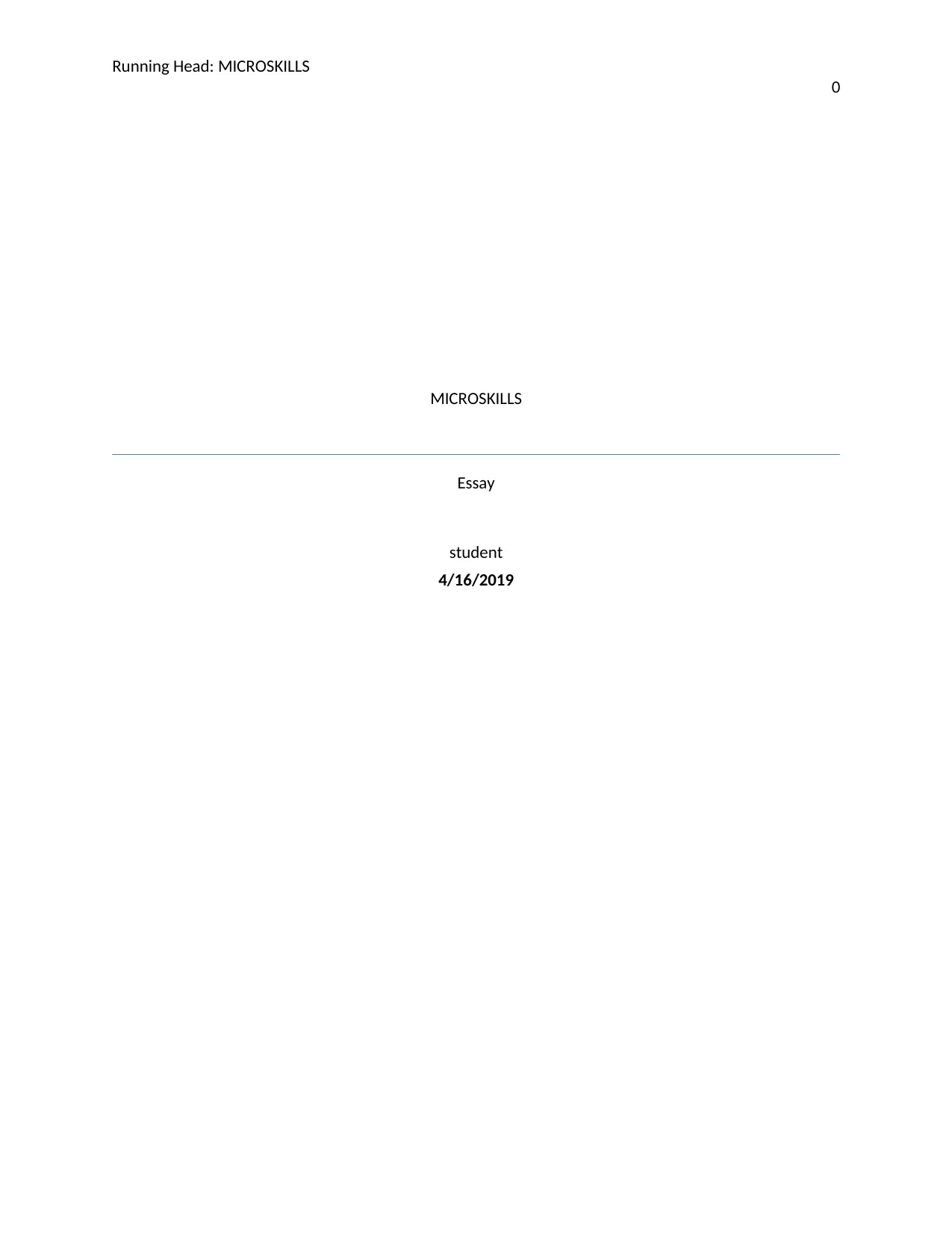
Running Head: MICROSKILLS
0
MICROSKILLS
Essay
student
4/16/2019
0
MICROSKILLS
Essay
student
4/16/2019
Paraphrase This Document
Need a fresh take? Get an instant paraphrase of this document with our AI Paraphraser
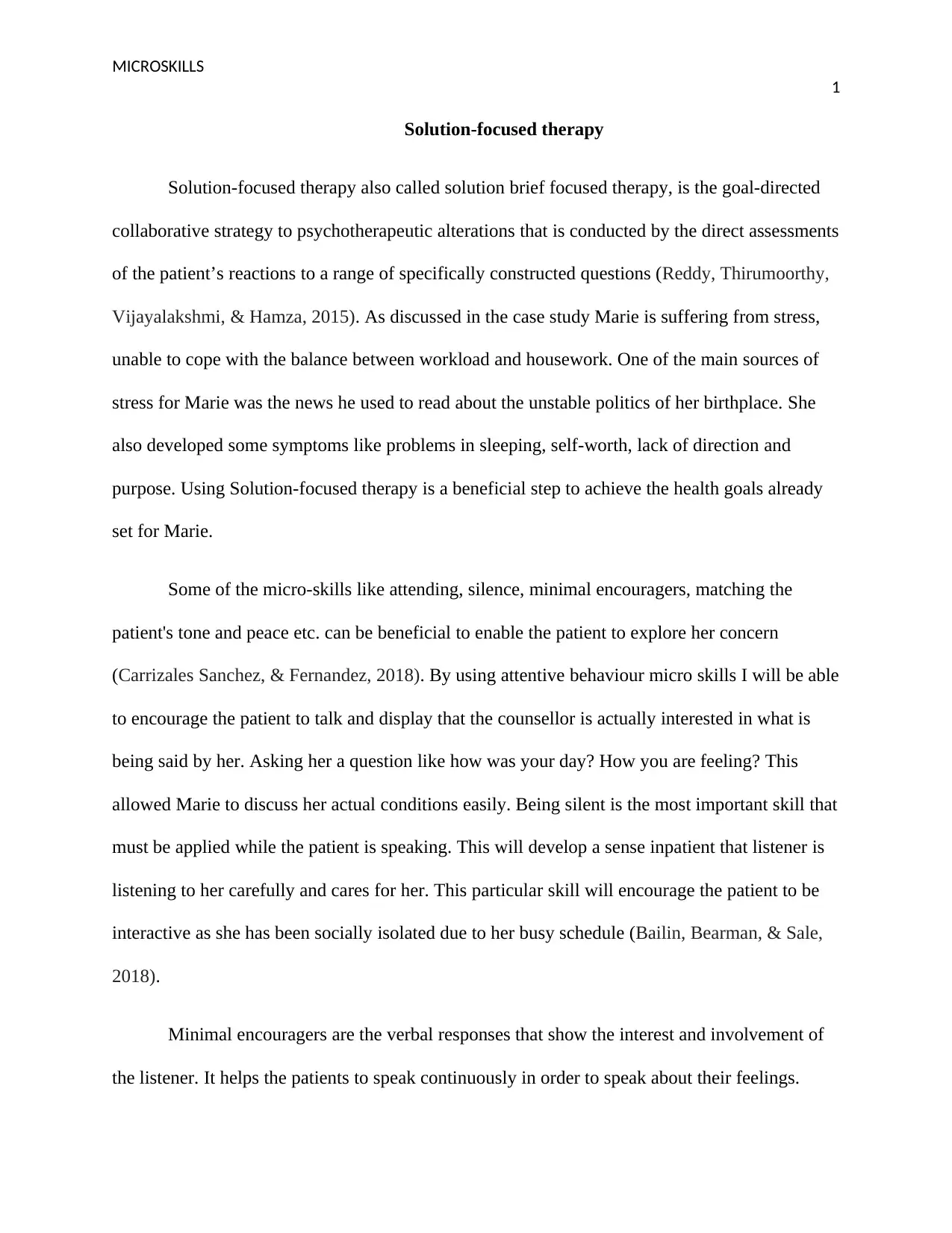
MICROSKILLS
1
Solution-focused therapy
Solution-focused therapy also called solution brief focused therapy, is the goal-directed
collaborative strategy to psychotherapeutic alterations that is conducted by the direct assessments
of the patient’s reactions to a range of specifically constructed questions (Reddy, Thirumoorthy,
Vijayalakshmi, & Hamza, 2015). As discussed in the case study Marie is suffering from stress,
unable to cope with the balance between workload and housework. One of the main sources of
stress for Marie was the news he used to read about the unstable politics of her birthplace. She
also developed some symptoms like problems in sleeping, self-worth, lack of direction and
purpose. Using Solution-focused therapy is a beneficial step to achieve the health goals already
set for Marie.
Some of the micro-skills like attending, silence, minimal encouragers, matching the
patient's tone and peace etc. can be beneficial to enable the patient to explore her concern
(Carrizales Sanchez, & Fernandez, 2018). By using attentive behaviour micro skills I will be able
to encourage the patient to talk and display that the counsellor is actually interested in what is
being said by her. Asking her a question like how was your day? How you are feeling? This
allowed Marie to discuss her actual conditions easily. Being silent is the most important skill that
must be applied while the patient is speaking. This will develop a sense inpatient that listener is
listening to her carefully and cares for her. This particular skill will encourage the patient to be
interactive as she has been socially isolated due to her busy schedule (Bailin, Bearman, & Sale,
2018).
Minimal encouragers are the verbal responses that show the interest and involvement of
the listener. It helps the patients to speak continuously in order to speak about their feelings.
1
Solution-focused therapy
Solution-focused therapy also called solution brief focused therapy, is the goal-directed
collaborative strategy to psychotherapeutic alterations that is conducted by the direct assessments
of the patient’s reactions to a range of specifically constructed questions (Reddy, Thirumoorthy,
Vijayalakshmi, & Hamza, 2015). As discussed in the case study Marie is suffering from stress,
unable to cope with the balance between workload and housework. One of the main sources of
stress for Marie was the news he used to read about the unstable politics of her birthplace. She
also developed some symptoms like problems in sleeping, self-worth, lack of direction and
purpose. Using Solution-focused therapy is a beneficial step to achieve the health goals already
set for Marie.
Some of the micro-skills like attending, silence, minimal encouragers, matching the
patient's tone and peace etc. can be beneficial to enable the patient to explore her concern
(Carrizales Sanchez, & Fernandez, 2018). By using attentive behaviour micro skills I will be able
to encourage the patient to talk and display that the counsellor is actually interested in what is
being said by her. Asking her a question like how was your day? How you are feeling? This
allowed Marie to discuss her actual conditions easily. Being silent is the most important skill that
must be applied while the patient is speaking. This will develop a sense inpatient that listener is
listening to her carefully and cares for her. This particular skill will encourage the patient to be
interactive as she has been socially isolated due to her busy schedule (Bailin, Bearman, & Sale,
2018).
Minimal encouragers are the verbal responses that show the interest and involvement of
the listener. It helps the patients to speak continuously in order to speak about their feelings.
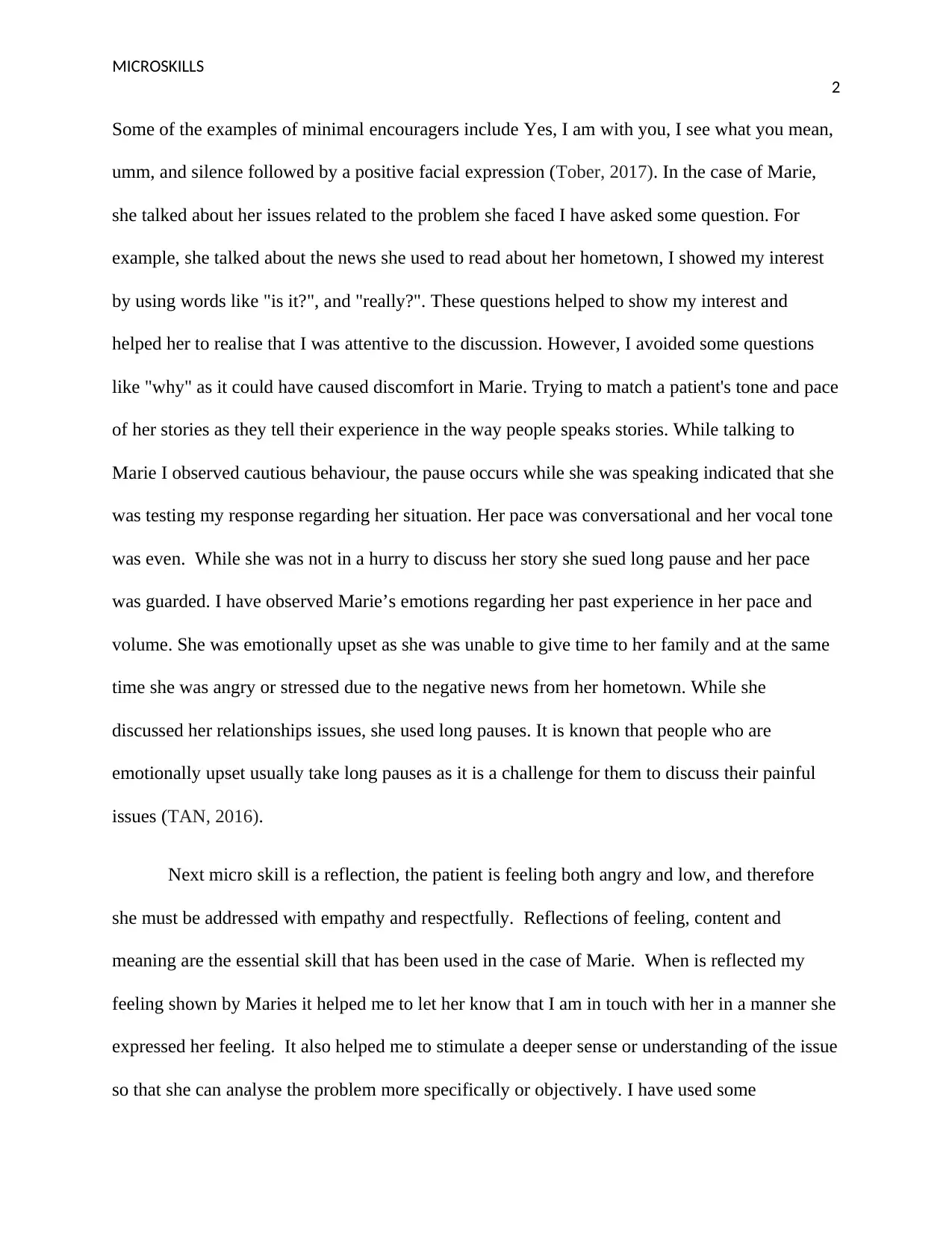
MICROSKILLS
2
Some of the examples of minimal encouragers include Yes, I am with you, I see what you mean,
umm, and silence followed by a positive facial expression (Tober, 2017). In the case of Marie,
she talked about her issues related to the problem she faced I have asked some question. For
example, she talked about the news she used to read about her hometown, I showed my interest
by using words like "is it?", and "really?". These questions helped to show my interest and
helped her to realise that I was attentive to the discussion. However, I avoided some questions
like "why" as it could have caused discomfort in Marie. Trying to match a patient's tone and pace
of her stories as they tell their experience in the way people speaks stories. While talking to
Marie I observed cautious behaviour, the pause occurs while she was speaking indicated that she
was testing my response regarding her situation. Her pace was conversational and her vocal tone
was even. While she was not in a hurry to discuss her story she sued long pause and her pace
was guarded. I have observed Marie’s emotions regarding her past experience in her pace and
volume. She was emotionally upset as she was unable to give time to her family and at the same
time she was angry or stressed due to the negative news from her hometown. While she
discussed her relationships issues, she used long pauses. It is known that people who are
emotionally upset usually take long pauses as it is a challenge for them to discuss their painful
issues (TAN, 2016).
Next micro skill is a reflection, the patient is feeling both angry and low, and therefore
she must be addressed with empathy and respectfully. Reflections of feeling, content and
meaning are the essential skill that has been used in the case of Marie. When is reflected my
feeling shown by Maries it helped me to let her know that I am in touch with her in a manner she
expressed her feeling. It also helped me to stimulate a deeper sense or understanding of the issue
so that she can analyse the problem more specifically or objectively. I have used some
2
Some of the examples of minimal encouragers include Yes, I am with you, I see what you mean,
umm, and silence followed by a positive facial expression (Tober, 2017). In the case of Marie,
she talked about her issues related to the problem she faced I have asked some question. For
example, she talked about the news she used to read about her hometown, I showed my interest
by using words like "is it?", and "really?". These questions helped to show my interest and
helped her to realise that I was attentive to the discussion. However, I avoided some questions
like "why" as it could have caused discomfort in Marie. Trying to match a patient's tone and pace
of her stories as they tell their experience in the way people speaks stories. While talking to
Marie I observed cautious behaviour, the pause occurs while she was speaking indicated that she
was testing my response regarding her situation. Her pace was conversational and her vocal tone
was even. While she was not in a hurry to discuss her story she sued long pause and her pace
was guarded. I have observed Marie’s emotions regarding her past experience in her pace and
volume. She was emotionally upset as she was unable to give time to her family and at the same
time she was angry or stressed due to the negative news from her hometown. While she
discussed her relationships issues, she used long pauses. It is known that people who are
emotionally upset usually take long pauses as it is a challenge for them to discuss their painful
issues (TAN, 2016).
Next micro skill is a reflection, the patient is feeling both angry and low, and therefore
she must be addressed with empathy and respectfully. Reflections of feeling, content and
meaning are the essential skill that has been used in the case of Marie. When is reflected my
feeling shown by Maries it helped me to let her know that I am in touch with her in a manner she
expressed her feeling. It also helped me to stimulate a deeper sense or understanding of the issue
so that she can analyse the problem more specifically or objectively. I have used some
⊘ This is a preview!⊘
Do you want full access?
Subscribe today to unlock all pages.

Trusted by 1+ million students worldwide
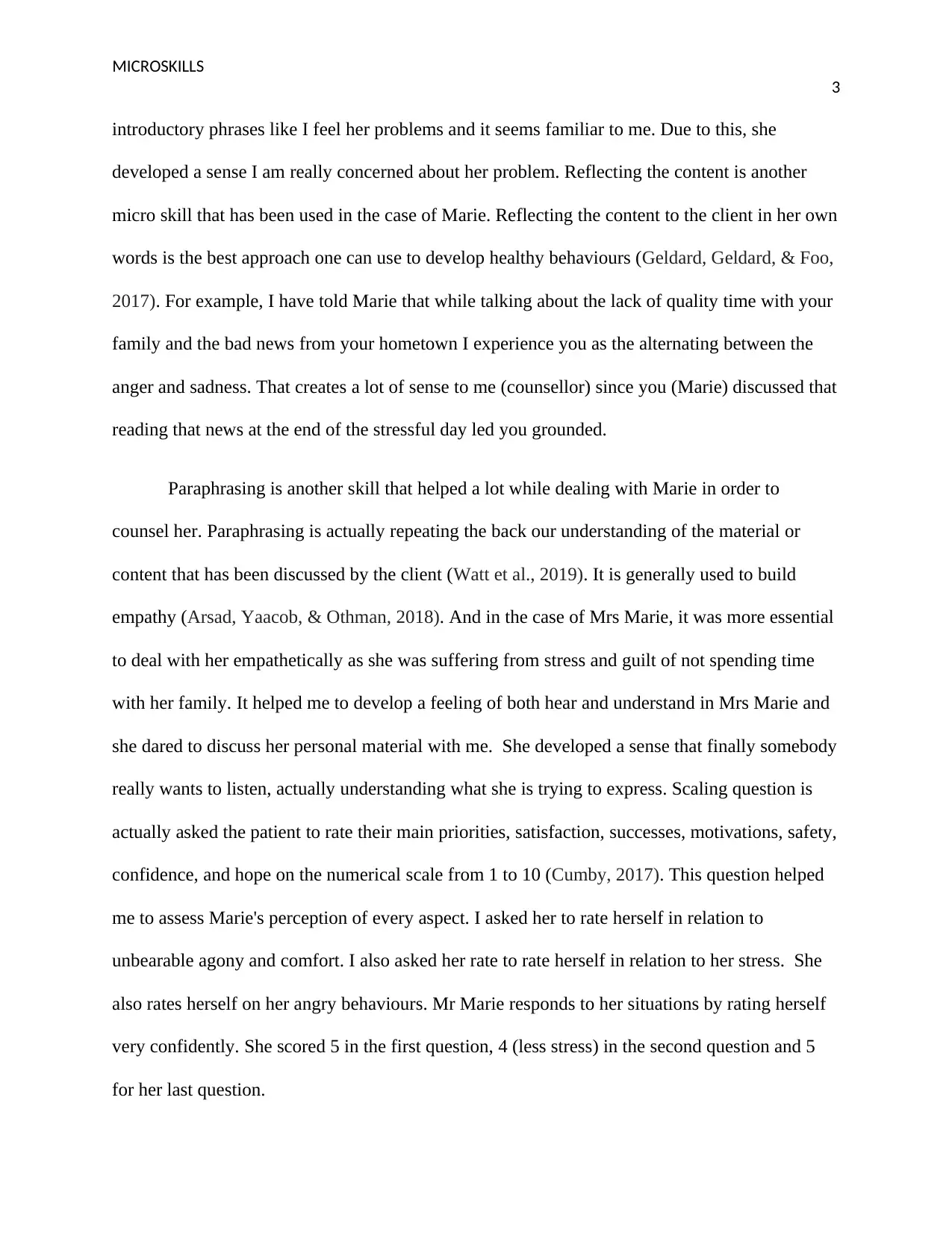
MICROSKILLS
3
introductory phrases like I feel her problems and it seems familiar to me. Due to this, she
developed a sense I am really concerned about her problem. Reflecting the content is another
micro skill that has been used in the case of Marie. Reflecting the content to the client in her own
words is the best approach one can use to develop healthy behaviours (Geldard, Geldard, & Foo,
2017). For example, I have told Marie that while talking about the lack of quality time with your
family and the bad news from your hometown I experience you as the alternating between the
anger and sadness. That creates a lot of sense to me (counsellor) since you (Marie) discussed that
reading that news at the end of the stressful day led you grounded.
Paraphrasing is another skill that helped a lot while dealing with Marie in order to
counsel her. Paraphrasing is actually repeating the back our understanding of the material or
content that has been discussed by the client (Watt et al., 2019). It is generally used to build
empathy (Arsad, Yaacob, & Othman, 2018). And in the case of Mrs Marie, it was more essential
to deal with her empathetically as she was suffering from stress and guilt of not spending time
with her family. It helped me to develop a feeling of both hear and understand in Mrs Marie and
she dared to discuss her personal material with me. She developed a sense that finally somebody
really wants to listen, actually understanding what she is trying to express. Scaling question is
actually asked the patient to rate their main priorities, satisfaction, successes, motivations, safety,
confidence, and hope on the numerical scale from 1 to 10 (Cumby, 2017). This question helped
me to assess Marie's perception of every aspect. I asked her to rate herself in relation to
unbearable agony and comfort. I also asked her rate to rate herself in relation to her stress. She
also rates herself on her angry behaviours. Mr Marie responds to her situations by rating herself
very confidently. She scored 5 in the first question, 4 (less stress) in the second question and 5
for her last question.
3
introductory phrases like I feel her problems and it seems familiar to me. Due to this, she
developed a sense I am really concerned about her problem. Reflecting the content is another
micro skill that has been used in the case of Marie. Reflecting the content to the client in her own
words is the best approach one can use to develop healthy behaviours (Geldard, Geldard, & Foo,
2017). For example, I have told Marie that while talking about the lack of quality time with your
family and the bad news from your hometown I experience you as the alternating between the
anger and sadness. That creates a lot of sense to me (counsellor) since you (Marie) discussed that
reading that news at the end of the stressful day led you grounded.
Paraphrasing is another skill that helped a lot while dealing with Marie in order to
counsel her. Paraphrasing is actually repeating the back our understanding of the material or
content that has been discussed by the client (Watt et al., 2019). It is generally used to build
empathy (Arsad, Yaacob, & Othman, 2018). And in the case of Mrs Marie, it was more essential
to deal with her empathetically as she was suffering from stress and guilt of not spending time
with her family. It helped me to develop a feeling of both hear and understand in Mrs Marie and
she dared to discuss her personal material with me. She developed a sense that finally somebody
really wants to listen, actually understanding what she is trying to express. Scaling question is
actually asked the patient to rate their main priorities, satisfaction, successes, motivations, safety,
confidence, and hope on the numerical scale from 1 to 10 (Cumby, 2017). This question helped
me to assess Marie's perception of every aspect. I asked her to rate herself in relation to
unbearable agony and comfort. I also asked her rate to rate herself in relation to her stress. She
also rates herself on her angry behaviours. Mr Marie responds to her situations by rating herself
very confidently. She scored 5 in the first question, 4 (less stress) in the second question and 5
for her last question.
Paraphrase This Document
Need a fresh take? Get an instant paraphrase of this document with our AI Paraphraser

MICROSKILLS
4
4
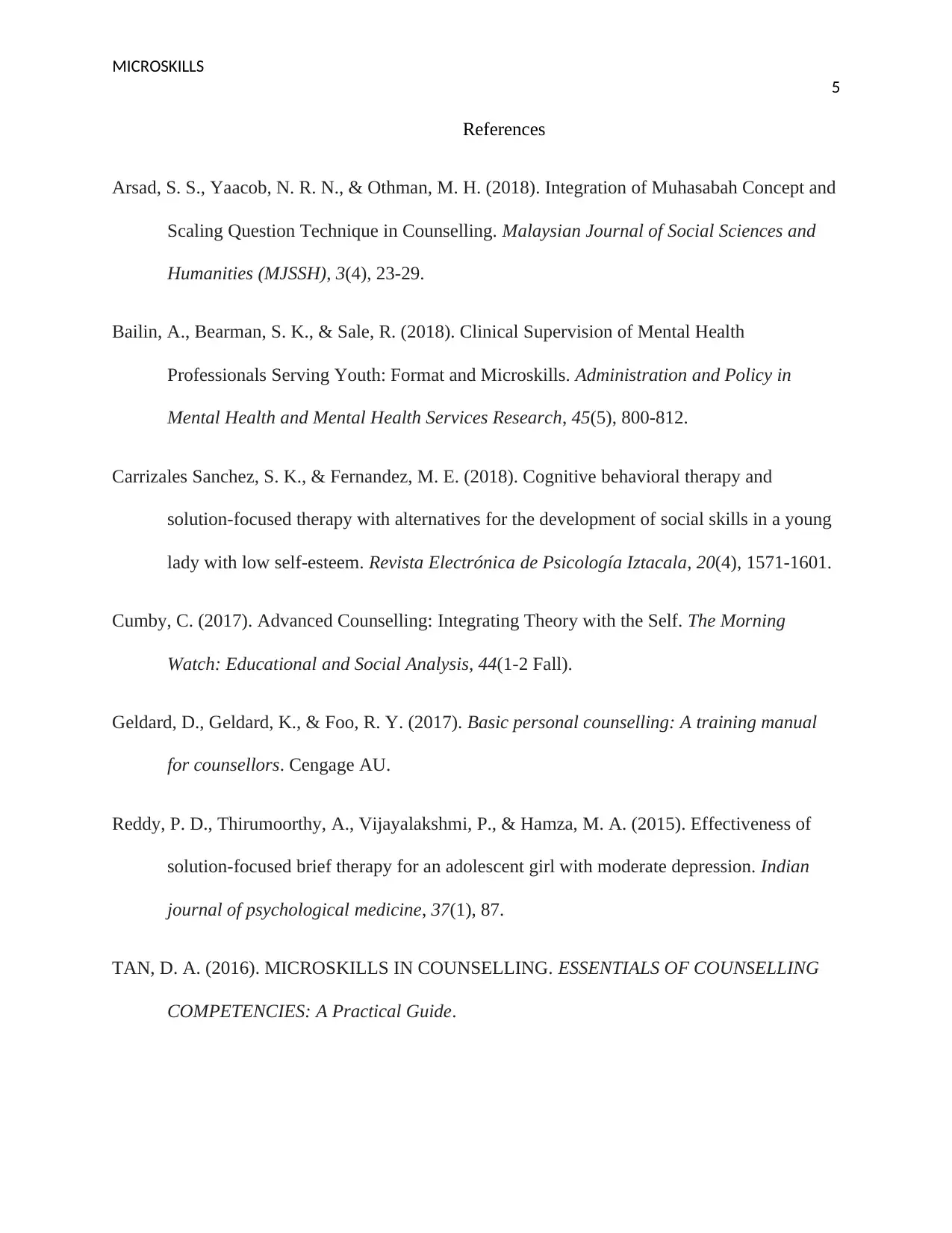
MICROSKILLS
5
References
Arsad, S. S., Yaacob, N. R. N., & Othman, M. H. (2018). Integration of Muhasabah Concept and
Scaling Question Technique in Counselling. Malaysian Journal of Social Sciences and
Humanities (MJSSH), 3(4), 23-29.
Bailin, A., Bearman, S. K., & Sale, R. (2018). Clinical Supervision of Mental Health
Professionals Serving Youth: Format and Microskills. Administration and Policy in
Mental Health and Mental Health Services Research, 45(5), 800-812.
Carrizales Sanchez, S. K., & Fernandez, M. E. (2018). Cognitive behavioral therapy and
solution-focused therapy with alternatives for the development of social skills in a young
lady with low self-esteem. Revista Electrónica de Psicología Iztacala, 20(4), 1571-1601.
Cumby, C. (2017). Advanced Counselling: Integrating Theory with the Self. The Morning
Watch: Educational and Social Analysis, 44(1-2 Fall).
Geldard, D., Geldard, K., & Foo, R. Y. (2017). Basic personal counselling: A training manual
for counsellors. Cengage AU.
Reddy, P. D., Thirumoorthy, A., Vijayalakshmi, P., & Hamza, M. A. (2015). Effectiveness of
solution-focused brief therapy for an adolescent girl with moderate depression. Indian
journal of psychological medicine, 37(1), 87.
TAN, D. A. (2016). MICROSKILLS IN COUNSELLING. ESSENTIALS OF COUNSELLING
COMPETENCIES: A Practical Guide.
5
References
Arsad, S. S., Yaacob, N. R. N., & Othman, M. H. (2018). Integration of Muhasabah Concept and
Scaling Question Technique in Counselling. Malaysian Journal of Social Sciences and
Humanities (MJSSH), 3(4), 23-29.
Bailin, A., Bearman, S. K., & Sale, R. (2018). Clinical Supervision of Mental Health
Professionals Serving Youth: Format and Microskills. Administration and Policy in
Mental Health and Mental Health Services Research, 45(5), 800-812.
Carrizales Sanchez, S. K., & Fernandez, M. E. (2018). Cognitive behavioral therapy and
solution-focused therapy with alternatives for the development of social skills in a young
lady with low self-esteem. Revista Electrónica de Psicología Iztacala, 20(4), 1571-1601.
Cumby, C. (2017). Advanced Counselling: Integrating Theory with the Self. The Morning
Watch: Educational and Social Analysis, 44(1-2 Fall).
Geldard, D., Geldard, K., & Foo, R. Y. (2017). Basic personal counselling: A training manual
for counsellors. Cengage AU.
Reddy, P. D., Thirumoorthy, A., Vijayalakshmi, P., & Hamza, M. A. (2015). Effectiveness of
solution-focused brief therapy for an adolescent girl with moderate depression. Indian
journal of psychological medicine, 37(1), 87.
TAN, D. A. (2016). MICROSKILLS IN COUNSELLING. ESSENTIALS OF COUNSELLING
COMPETENCIES: A Practical Guide.
⊘ This is a preview!⊘
Do you want full access?
Subscribe today to unlock all pages.

Trusted by 1+ million students worldwide
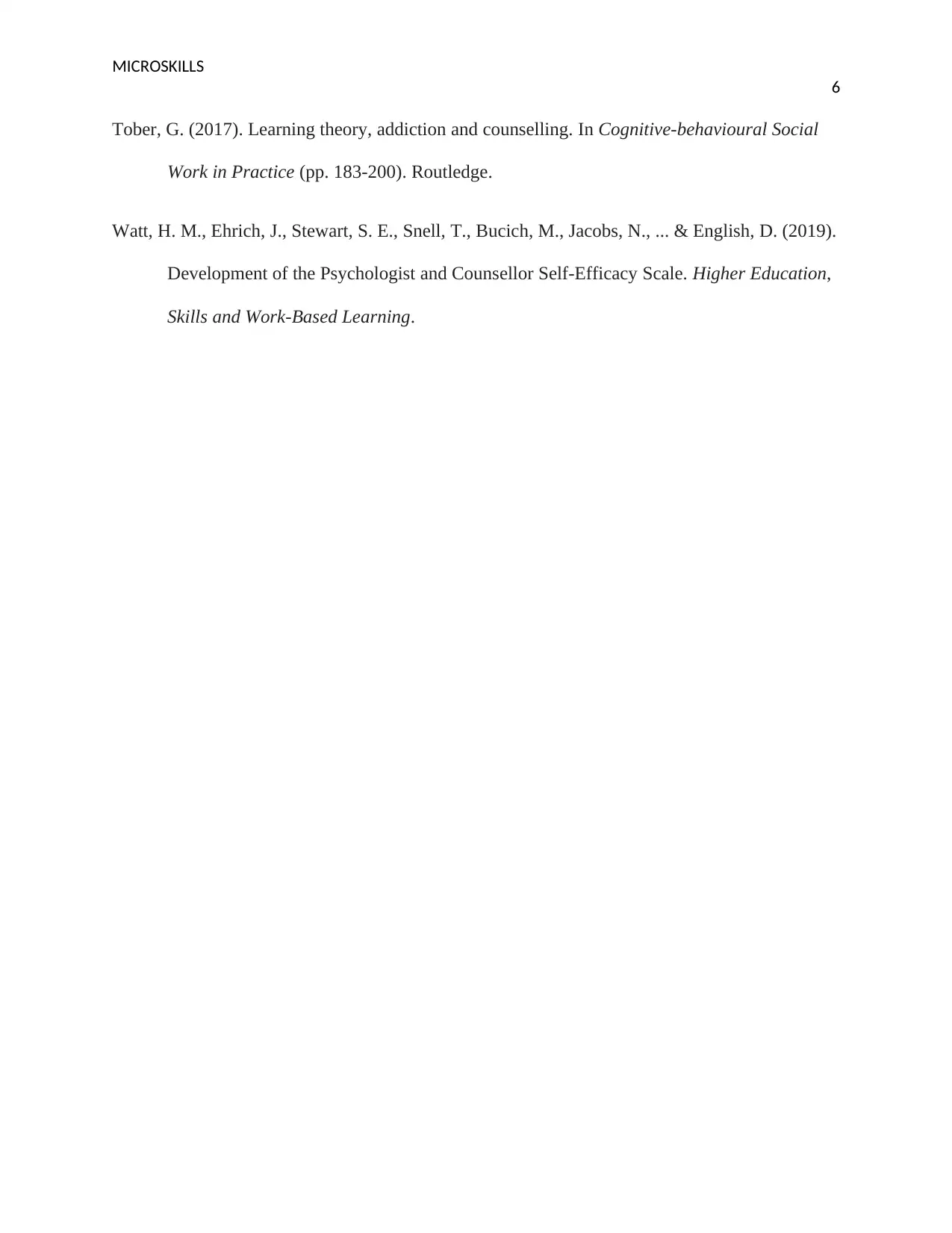
MICROSKILLS
6
Tober, G. (2017). Learning theory, addiction and counselling. In Cognitive-behavioural Social
Work in Practice (pp. 183-200). Routledge.
Watt, H. M., Ehrich, J., Stewart, S. E., Snell, T., Bucich, M., Jacobs, N., ... & English, D. (2019).
Development of the Psychologist and Counsellor Self-Efficacy Scale. Higher Education,
Skills and Work-Based Learning.
6
Tober, G. (2017). Learning theory, addiction and counselling. In Cognitive-behavioural Social
Work in Practice (pp. 183-200). Routledge.
Watt, H. M., Ehrich, J., Stewart, S. E., Snell, T., Bucich, M., Jacobs, N., ... & English, D. (2019).
Development of the Psychologist and Counsellor Self-Efficacy Scale. Higher Education,
Skills and Work-Based Learning.
1 out of 7
Related Documents
Your All-in-One AI-Powered Toolkit for Academic Success.
+13062052269
info@desklib.com
Available 24*7 on WhatsApp / Email
![[object Object]](/_next/static/media/star-bottom.7253800d.svg)
Unlock your academic potential
Copyright © 2020–2026 A2Z Services. All Rights Reserved. Developed and managed by ZUCOL.




